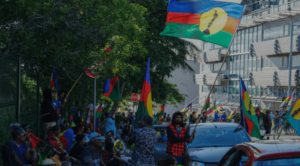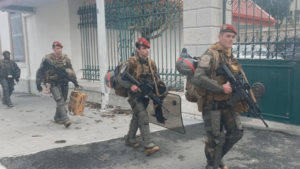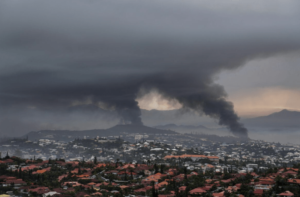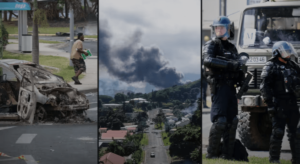Indigenous populations reject the new electoral bill proposed by France
For the third consecutive day, France’s overseas territory of New Caledonia has been engulfed in violence as indigenous Kanak people protest against newly proposed electoral reforms by President Emmanuel Macron’s government. The Kanak people, who make up 40% of New Caledonia’s population, are seeing the electoral reforms as a threat to their political representation and autonomy.
Under the Nouméa Accord of 1998, France had agreed to give New Caledonia more autonomy and eventual emancipation after a 20-year period. However, in the last independence referendum in 2021, the majority of the nation’s inhabitants opted for a French-ruled government.

The indigenous population of New Caledonia fears that the new electoral reforms to add new settlers who arrived in the country after the signing of the Nouméa Accords will significantly reduce their influence in future elections. As a result, violent protests broke out across the nation, igniting waves of unrest that have disrupted the island’s daily life as of late.
The ensuing violence this week has resulted in the closure of airports and vital road networks, claiming the lives of four people so far, including a gendarme (French Paramilitary Police). Rioters have burned houses, cars, and supermarkets, blocked roads with makeshift barricades, and even shot at police officers.

Following the deadly unrest, France declared a state of emergency in New Caledonia on May 15 and has sent military forces to boost security in the archipelago. The emergency is set to last for the next 12 days, during which police and military officials will curb the violence and restore peace and order to the nation.
France’s Prime Minister Gabriel Attal announced the emergency measures at 8 p.m. in Paris, corresponding to 5 a.m. Thursday in New Caledonia. French military forces were deployed to control the widespread violence and to free up the airports and ports of the country.

He said, “Nothing can ever justify violence. Our absolute priority for the next few hours is the return to order and calm”.
Authorities have been instructed to enforce strict measures like night-time curfews to curb looting and rioting, with significant power expansions to conduct searches, seize weapons, and detain people deemed a threat to public order.

The French Interior Minister informed that 500 additional officers have been deployed in the archipelago in addition to the 1,800 police and gendarmes currently striving to restore order. He also said that over 130 people have been arrested so far.
Decades of peace shattered by violent protests in New Caledonia
New Caledonia first came under French colonial control in September 1853, and the indigenous Kanak people have repeatedly clashed with the government, resulting in violent anti-government protests.

But the Matignon Agreements of 1988 and the subsequent Nouméa Accords in 1998 brought a few decades of relative peace to the archipelago. Under the Nouméa Accords, the French government decided to bestow greater autonomy on the island with plans to emancipate the territory of New Caledonia over a 20-year period, following which a referendum for independence would be held.
New Caledonia rejected the independence referendum
In 2018, a referendum was held, and the majority of the island nation’s inhabitants rejected independence. Another referendum held in 2020 also yielded the same result, with a minor margin of difference.
The third referendum was called in 2021, but the island’s pro-independent groups boycotted it, citing the impact of the COVID-19 pandemic. As a result, over 96% of the country’s population rejected independence from France.

Recently, the National Assembly in Paris approved a measure to add new settlers to New Caledonia’s electoral roll after a long debate. The vote, reported by Al Jazeera, passed with 351 in favour and 153 against, shortly after midnight on Tuesday.
The indigenous Kanak people, who make up 40 percent of the island’s population of over 300,000, currently hold a majority in the Nouméa Accords electoral roll. The new electoral reforms will severely reduce their influence on the country.











